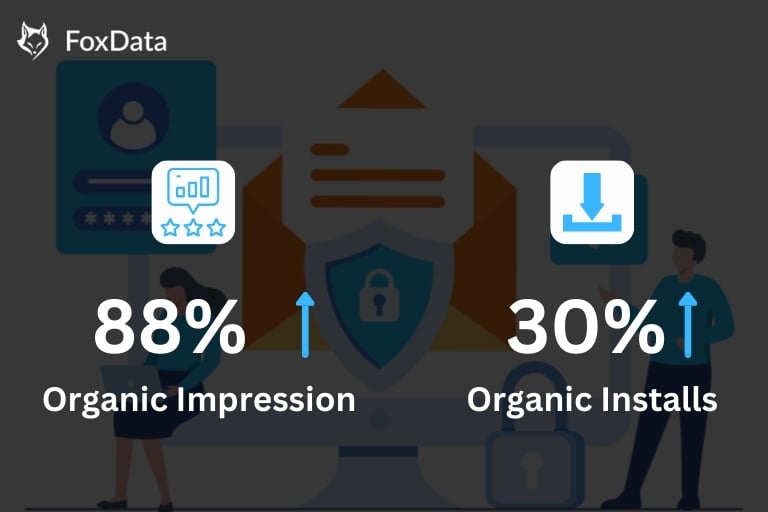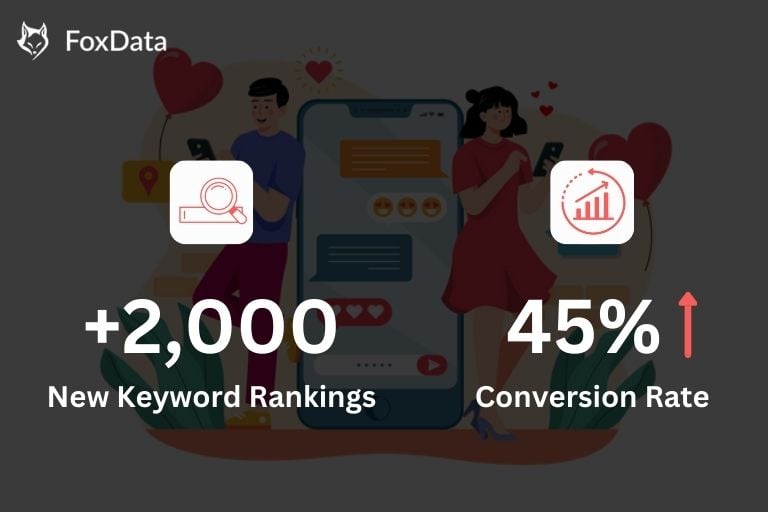How FoxData Helped ESports Short-term RentalsApp Achieve a 75% Retention Rate in India

Travel apps have suffered a heavy loss of users since COVID-19, and competition is fierce, especially in the Indian market. It is difficult for the related travel apps created after the epidemic to grab market share. This blog discusses the development of the eSports short-term rental app and the collaboration with FoxData to help it open up its visibility and achieve a 75% retention rate in the Indian market.
App Story
Our client is an early-stage startup that runs an eSports short-term rental app. The client is from India and wants to open up the market for eSports short-term rentals in Indian and Thailand. Launching in 2022, the software is available for Android and iOS. The software is dedicated to creating a unique and comfortable short-term rental option for its users. In addition to the basic short-term rental service, the software also provides a community function for users who are passionate about eSports to communicate with each other. Since the launch of the software, it has gradually gained popularity and profitability in Thailand. However, the Indian market was hit hard during the startup period due to the epidemic, which caused the software to run poorly. As a startup, the company was looking for a professional solution with a budget of $1,000 per month, so they turned to FoxData. we communicated with Leo Wang, Head of Marketing, about their market situation and needs.
Challenges
1. App's visibility
During the pandemic in India, the app encountered a substantial hurdle. The demand for short-term rental dwindled, leading to a decrease in the number of downloads for short-term rental apps. This downturn made it challenging for them to elevate their ranking within the app marketplace. Faced with this predicament, they need a tool that could aid in App Store Optimization to enhance the visibility of their app in the app store.
2. Engaging Users Effectively
Successful user retention is not a mere coincidence; it is the outcome of a meticulously planned and executed engagement strategy. For brands, especially those like this eSports short-term rentals app, it's imperative to actively and meaningfully engage with their user base. This engagement should not only demonstrate the value that the app brings to their users but also foster positive habits over time, encouraging users to regularly interact with the app.
For this startup, cultivating fruitful and enduring relationships with their customers means crafting unique brand experiences across a multitude of touchpoints. These touchpoints should not be limited to the app itself but extend beyond it. This could include social media platforms, email newsletters, in-app notifications, and even real-world events or collaborations related to eSports. Each interaction, whether within or outside the app, should be designed to resonate with users, providing them with valuable content and experiences that enhance their connection with the brand.
3. Advanced Analytics Capabilities
As an early-stage startup that had recently completed a modest pre-seed funding round, the team was operating on a tight budget. This financial constraint made it impossible to adopt multiple solutions to analyze, segment, and engage their user base. The team was in search of a solution that was not only startup-friendly but also equipped with comprehensive documentation to facilitate effortless implementation.
The power of real-time behavioral data cannot be undermined when it comes to understanding users and engaging with them promptly and effectively. However, employing multiple tools for analytics and engagement can complicate the process of interpreting user behavior. This complexity can obstruct effective decision-making, thereby posing a challenge to the smooth operation of the startup. Hence, the team required a single, efficient platform that could streamline their analytics and engagement strategies, making the process more comprehensible and effective.
4. Retaining Users and Reducing Churn
The most significant vulnerability for many apps, including this eSports short-term rental app in India, is user retention. Retaining users over the long term can be a daunting task, yet it's the lifeblood of any app-based business. Therefore, it's crucial for the startup to prioritize a retention-first marketing strategy.
This strategy should not merely focus on acquiring new users but should place equal emphasis on retaining existing ones. By balancing user acquisition and retention, the startup can ensure a steady growth rate while maintaining a robust user base. This approach is particularly important in the eSports industry, where the competition is fierce, and user loyalty can significantly impact the success of the app.
Reducing churn, or the rate at which users stop using the app, is another critical aspect of this strategy. High churn rates can be detrimental to the startup's growth and profitability. Therefore, identifying the reasons behind user churn and addressing them proactively can lead to improved user retention.
Solutions
The startup marketing team needed an integrated analytical and engagement solution. Their search ended with FoxData, enabling them to connect with users in a contextual and timely manner.
1. Enhance App's visibility
Following an extensive research process, the team decided to utilize FoxData's comprehensive suite of tools to conduct an in-depth analysis of their competitors. Tools such as app tracking, version tracking, and more provided valuable insights into their competitors' strategies, which they could then use to shape their own approach.
Moreover, FoxData's market function proved instrumental in identifying prevailing industry trends. By incorporating these trends into their strategy, the rental app was able to stay competitive and ahead of the curve.
In addition to competitor analysis and trend identification, the rental app also made use of FoxData's keyword research tools. These tools helped them discover and integrate the most effective keywords into their app's metadata. They found that by including more general, non-branded keywords in their title, they could significantly increase the app's visibility and lessen their reliance on branded searches.
Currently, two-thirds of the app's organic downloads are a result of generic searches rather than branded keywords. This shift underscores the impact of data-driven decision-making and its role in achieving App Store Optimization (ASO) success. You can check your own app performance on FoxData!
2. Utilizing Audience Segmentation to Accurately Target Diverse User Groups
FoxData offers a unique service that enables the categorization of users into distinct segments. This segmentation is based on a mix of user activities and properties, allowing for a more focused approach to addressing the specific needs or status of each user group. Such a targeted approach contributes significantly to achieving engagement and retention goals.
In the app, user segmentation is carried out based on the following criteria:
-
Order Fulfilment Status: This categorizes users into 'new' or 'old' based on whether they have completed an order. Further subdivisions are created within these segments using event properties. For instance, specific segments are crafted for users who have registered but haven't placed an order yet, or for those who have placed an order but are awaiting fulfillment.
-
Activity Status: The activity status of a user is determined by their recent engagement with the app. For example, if an existing user hasn't placed an order within the past 60 days, they are classified as 'inactive'.
-
Purchase Value: Certain event properties, such as the Average Order Value (AOV) and the number of orders successfully delivered, are used to identify high-purchase users. To encourage the retention of these power users, the company has recently introduced a loyalty program. This program is designed to specifically target this segment and ensure their continued engagement and loyalty.
Through these precise segmentation methods, the app aims to deliver a more personalized user experience, thereby enhancing user engagement and retention.
3. Optimizing Campaigns to Boost User Engagement
FoxData provides professional reports and campaigns to the startup. The startup employs A/B testing techniques to experiment with multiple variations of a campaign. This approach allows to identify the version that performs the best in terms of user engagement and response.
Additionally, understanding the optimal time to launch a campaign based on user activity trends has proven to be effective for the app. By determining when users are most active or receptive, they can ensure their campaigns reach users at the most opportune moments.
4. Utilizing App Performation Tracking
The rental app utilize FoxData to track their app's performance. By leveraging the insights and app performance provided by FoxData, the rental app can make data-driven decisions regarding app improvements, updates, and feature enhancements. The performance metrics and user behavior analysis help in identifying areas of focus and prioritizing development efforts based on actual data, increasing the chances of delivering a successful and well-optimized app.
Results
That is a remarkable achievement! The rise in rankings, increase in app stickiness, and high monthly retention rate indicate the success and growing popularity of their software in the Travel Tools category in India:
-
Improved App Store Rankings: Moving up from #176 to #33 in the Travel Tools category is a significant accomplishment. This rise in rankings means that their software is gaining visibility and attracting more potential users. Higher rankings increase the chances of organic discovery and downloads, contributing to user acquisition and growth.
-
Increased App Stickiness: A 46% increase in app stickiness implies that users are spending more time engaging with their software. App stickiness measures the level of user engagement and the frequency of app usage. This indicates that users find value in their app and are more likely to return to it repeatedly. Higher app stickiness can lead to increased user satisfaction and loyalty.
-
Impressive Monthly Retention Rate: A 75% monthly retention rate indicates that a significant percentage of users continue to use their app on a monthly basis. This high retention rate suggests that their software is meeting users' needs and providing a compelling experience that keeps them coming back. Retaining users over time is crucial for long-term success and can lead to increased monetization opportunities and word-of-mouth recommendations.
Overall, these statistics demonstrate the positive impact their software has had in the Travel Tools category in India. The rise in rankings, increased app stickiness, and high monthly retention rate indicate that their app is resonating with users, delivering value, and gaining traction in the market. It is a testament to the effectiveness of your app's features, user experience, and marketing efforts. It's important to continue monitoring and optimizing these metrics to sustain and further enhance your app's success.






